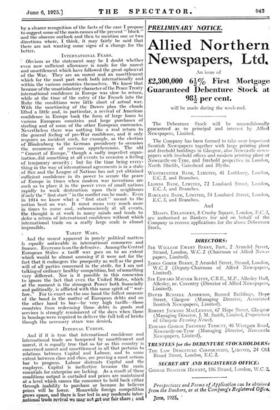INTERNATIONAL FEARS.
' Obvious as the statement may be I doubt whether even now sufficient allowance is made for the unrest and unsettlement which have followed the great upheaval of the War. They are an unrest and an unsettlement which for the most part work both internationally and within the various countries themselves. We know that because of the unsatisfactory character of the Peace Treaty international confidence in Europe was slow to return, while at the time of the entry of the French into the Ruhr the conditions were little short of actual war. With the sanctioning of the Dawes plan the clouds lifted a little and, in particular, a revival of American confidence in Europe took the form of large loans to various European countries and large purchases of sterling and of some of the other European currencies. Nevertheless there was nothing like a real return to the general feeling of pre-War confidence, and it only requires an incident such, for example, as the election of Hindenburg to the German presidency to occasion the recurrence of nervous apprehensions. The old " Concert of Europe," though a sadly imperfect organ- ization, did something at all events to occasion a feeling of temporary security ; but for the time being every- thing in the way of international agreements is in a state of flux and the League of Nations has not yet obtained sufficient confidence in its power to secure the peace of Europe in times when modern war inventions are such as to place it in the power even of small nations rapidly to work destruction upon their neighbours if only the " first start " in the conflict can be made. Even in 1914 we know what a " first start " meant to the nation bent on war. It must mean very much more in times to come and, subconsciously at all events, the thought is at work in many minds and tends to defer a return of international confidence without which international trade on a really large scale is almost impossible.














































 Previous page
Previous page